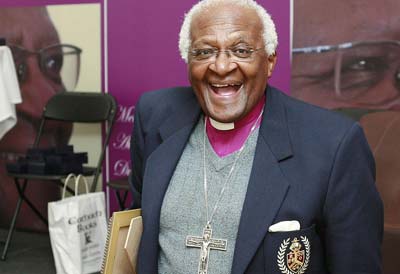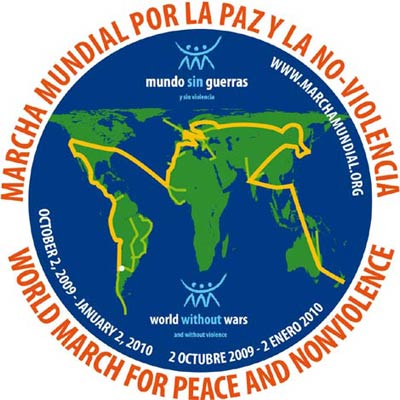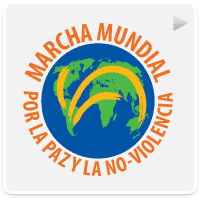The Invisibles against US missile defense
Desmond Tutu supports the World March for Peace and Nonviolence
28.9.2008

The sudafrican Archbishop Desmond Mpilo Tutu support World March for Peace and Nonviolence, that start on november the 2ns 2009 in New Zealand.
Desmond Mpilo Tutu is a South African cleric and activist who rose to worldwide fame during the 1980s as an opponent of apartheid. In 1984, Tutu became the second South African to be awarded the Nobel Peace Prize.
Tutu was elected and ordained the first black South African Anglican Archbishop of Cape Town, South Africa, and primate of the Church of the Province of Southern Africa (now the Anglican Church of Southern Africa). Tutu chaired the Truth and Reconciliation Commission and is currently the chairman of The Elders. Tutu is vocal in his defence of human rights and uses his high profile to campaign for the oppressed. Tutu also campaigns to fight AIDS, poverty and racism.
He received the Nobel Peace Prize in 1984, the Albert Schweitzer Prize for Humanitarianism, and the Gandhi Peace Prize in 2007. Tutu has also compiled several books of his speeches and sayings.
Desmond Mpilo Tutu was born in Klerksdorp, Transvaal on 7 October 1931, the second of the three children of Zacheriah Zililo Tutu and his wife, Aletta, although the only son.[1] Tutu's family moved to Johannesburg when he was 12 years old where his father was a teacher and his mother a cleaner and cook at a school for the blind.
Here he met Trevor Huddleston who was a parish priest in the black slum of Sophiatown. "One day", said Tutu, "I was standing in the street with my mother when a white man in a priest's clothing walked past. As he passed us he took off his hat to my mother. I couldn't believe my eyes - a white man who greeted a black working class woman!"
Although Tutu wanted to become a physician, his family could not afford the training, and he followed his father's footsteps into teaching. Tutu studied at the Pretoria Bantu Normal College from 1951 through 1953, and went on to teach at Johannesburg Bantu High School and at Munsienville High School in Mogale City.
However, he resigned following the passage of the Bantu Education Act, in protest of the poor educational prospects for black South Africans. He continued his studies, this time in theology, at St Peter's Theology College in Rosettenville and in 1960 was ordained as an Anglican minister following in the footsteps of his mentor and fellow activist, Trevor Huddleston.
Tutu then travelled to King's College London, (1962–1966), where he received his Bachelor's and Master's degrees in Theology. During this time he worked as a part-time curate, first at St Albans Cathedral and then at St. Mary's in Bletchingley, Surrey. He later returned to South Africa and from 1967 until 1972 used his lectures to highlight the circumstances of the African population.
He wrote a letter to Prime Minister B.J. Vorster, in which he described the situation in South Africa as a "powder barrel that can explode at any time." The letter was never answered. He became chaplain at the University of Fort Hare in 1967, a hotbed of dissent and one of the few quality universities for African students in the southern part of Africa. From 1970 to 1972, Tutu lectured at the National University of Lesotho.
Tutu faced a difficult balancing act: voicing black discontent while leading a largely white parish. He alternated charm with challenges as he appealed to his parish's Afrikaner heritage, recalling that their forebears had endured British concentration camps.
Somewhat to the bewilderment of other black leaders, he patiently courted Vorster’s successor, P. W. Botha, explaining that even Moses continued to reason with Pharaoh. But white liberals grew nervous when Tutu called for a boycott of South African products.
In 1972 Tutu returned to the UK, where he was appointed vice-director of the Theological Education Fund of the World Council of Churches, at Bromley in Kent. He returned to South Africa in 1975 and was appointed Anglican Dean of St. Mary's Cathedral in Johannesburg — the first African person to hold that position.
http://www.worldmarch.info/en
http://en.wikipedia.org/wiki/Desmond_Tutu


Desmond Mpilo Tutu is a South African cleric and activist who rose to worldwide fame during the 1980s as an opponent of apartheid. In 1984, Tutu became the second South African to be awarded the Nobel Peace Prize.
Tutu was elected and ordained the first black South African Anglican Archbishop of Cape Town, South Africa, and primate of the Church of the Province of Southern Africa (now the Anglican Church of Southern Africa). Tutu chaired the Truth and Reconciliation Commission and is currently the chairman of The Elders. Tutu is vocal in his defence of human rights and uses his high profile to campaign for the oppressed. Tutu also campaigns to fight AIDS, poverty and racism.
He received the Nobel Peace Prize in 1984, the Albert Schweitzer Prize for Humanitarianism, and the Gandhi Peace Prize in 2007. Tutu has also compiled several books of his speeches and sayings.
Desmond Mpilo Tutu was born in Klerksdorp, Transvaal on 7 October 1931, the second of the three children of Zacheriah Zililo Tutu and his wife, Aletta, although the only son.[1] Tutu's family moved to Johannesburg when he was 12 years old where his father was a teacher and his mother a cleaner and cook at a school for the blind.
Here he met Trevor Huddleston who was a parish priest in the black slum of Sophiatown. "One day", said Tutu, "I was standing in the street with my mother when a white man in a priest's clothing walked past. As he passed us he took off his hat to my mother. I couldn't believe my eyes - a white man who greeted a black working class woman!"
Although Tutu wanted to become a physician, his family could not afford the training, and he followed his father's footsteps into teaching. Tutu studied at the Pretoria Bantu Normal College from 1951 through 1953, and went on to teach at Johannesburg Bantu High School and at Munsienville High School in Mogale City.
However, he resigned following the passage of the Bantu Education Act, in protest of the poor educational prospects for black South Africans. He continued his studies, this time in theology, at St Peter's Theology College in Rosettenville and in 1960 was ordained as an Anglican minister following in the footsteps of his mentor and fellow activist, Trevor Huddleston.
Tutu then travelled to King's College London, (1962–1966), where he received his Bachelor's and Master's degrees in Theology. During this time he worked as a part-time curate, first at St Albans Cathedral and then at St. Mary's in Bletchingley, Surrey. He later returned to South Africa and from 1967 until 1972 used his lectures to highlight the circumstances of the African population.
He wrote a letter to Prime Minister B.J. Vorster, in which he described the situation in South Africa as a "powder barrel that can explode at any time." The letter was never answered. He became chaplain at the University of Fort Hare in 1967, a hotbed of dissent and one of the few quality universities for African students in the southern part of Africa. From 1970 to 1972, Tutu lectured at the National University of Lesotho.
Tutu faced a difficult balancing act: voicing black discontent while leading a largely white parish. He alternated charm with challenges as he appealed to his parish's Afrikaner heritage, recalling that their forebears had endured British concentration camps.
Somewhat to the bewilderment of other black leaders, he patiently courted Vorster’s successor, P. W. Botha, explaining that even Moses continued to reason with Pharaoh. But white liberals grew nervous when Tutu called for a boycott of South African products.
In 1972 Tutu returned to the UK, where he was appointed vice-director of the Theological Education Fund of the World Council of Churches, at Bromley in Kent. He returned to South Africa in 1975 and was appointed Anglican Dean of St. Mary's Cathedral in Johannesburg — the first African person to hold that position.
http://www.worldmarch.info/en
http://en.wikipedia.org/wiki/Desmond_Tutu


« back









